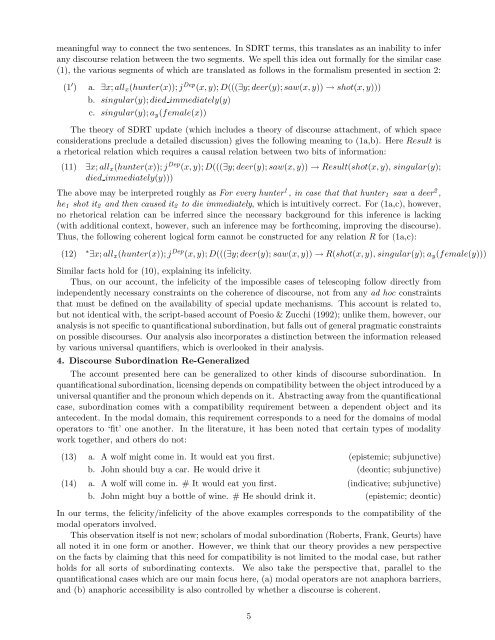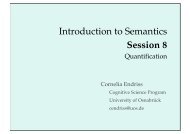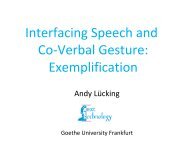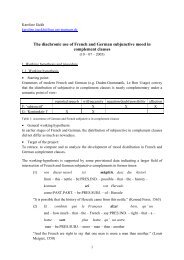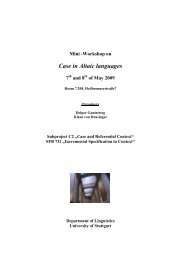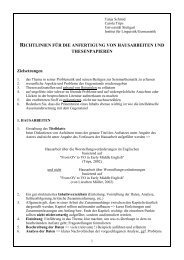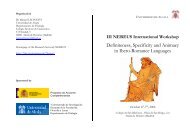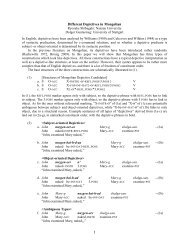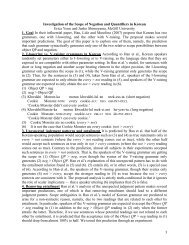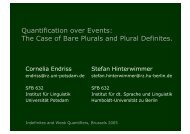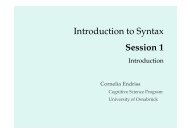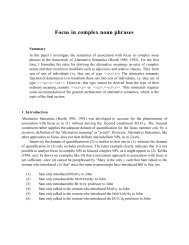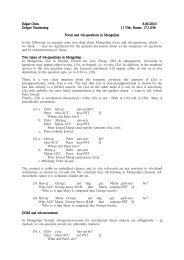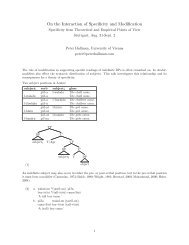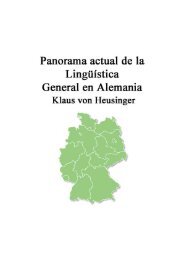SemPrag03.Progr.pdf - Institut für Linguistik/Germanistik - Universität ...
SemPrag03.Progr.pdf - Institut für Linguistik/Germanistik - Universität ...
SemPrag03.Progr.pdf - Institut für Linguistik/Germanistik - Universität ...
Create successful ePaper yourself
Turn your PDF publications into a flip-book with our unique Google optimized e-Paper software.
meaningful way to connect the two sentences. In SDRT terms, this translates as an inability to infer<br />
any discourse relation between the two segments. We spell this idea out formally for the similar case<br />
(1), the various segments of which are translated as follows in the formalism presented in section 2:<br />
(1 ′ ) a. ∃x; all x (hunter(x)); j Dep (x, y); D(((∃y; deer(y); saw(x, y)) → shot(x, y)))<br />
b. singular(y); died immediately(y)<br />
c. singular(y); a y (female(x))<br />
The theory of SDRT update (which includes a theory of discourse attachment, of which space<br />
considerations preclude a detailed discussion) gives the following meaning to (1a,b). Here Result is<br />
a rhetorical relation which requires a causal relation between two bits of information:<br />
(11) ∃x; all x (hunter(x)); j Dep (x, y); D(((∃y; deer(y); saw(x, y)) → Result(shot(x, y), singular(y);<br />
died immediately(y)))<br />
The above may be interpreted roughly as For every hunter 1 , in case that that hunter 1 saw a deer 2 ,<br />
he 1 shot it 2 and then caused it 2 to die immediately, which is intuitively correct. For (1a,c), however,<br />
no rhetorical relation can be inferred since the necessary background for this inference is lacking<br />
(with additional context, however, such an inference may be forthcoming, improving the discourse).<br />
Thus, the following coherent logical form cannot be constructed for any relation R for (1a,c):<br />
(12) ∗ ∃x; all x (hunter(x)); j Dep (x, y); D(((∃y; deer(y); saw(x, y)) → R(shot(x, y), singular(y); a y (female(y)))<br />
Similar facts hold for (10), explaining its infelicity.<br />
Thus, on our account, the infelicity of the impossible cases of telescoping follow directly from<br />
independently necessary constraints on the coherence of discourse, not from any ad hoc constraints<br />
that must be defined on the availability of special update mechanisms. This account is related to,<br />
but not identical with, the script-based account of Poesio & Zucchi (1992); unlike them, however, our<br />
analysis is not specific to quantificational subordination, but falls out of general pragmatic constraints<br />
on possible discourses. Our analysis also incorporates a distinction between the information released<br />
by various universal quantifiers, which is overlooked in their analysis.<br />
4. Discourse Subordination Re-Generalized<br />
The account presented here can be generalized to other kinds of discourse subordination. In<br />
quantificational subordination, licensing depends on compatibility between the object introduced by a<br />
universal quantifier and the pronoun which depends on it. Abstracting away from the quantificational<br />
case, subordination comes with a compatibility requirement between a dependent object and its<br />
antecedent. In the modal domain, this requirement corresponds to a need for the domains of modal<br />
operators to ‘fit’ one another. In the literature, it has been noted that certain types of modality<br />
work together, and others do not:<br />
(13) a. A wolf might come in. It would eat you first. (epistemic; subjunctive)<br />
b. John should buy a car. He would drive it (deontic; subjunctive)<br />
(14) a. A wolf will come in. # It would eat you first. (indicative; subjunctive)<br />
b. John might buy a bottle of wine. # He should drink it. (epistemic; deontic)<br />
In our terms, the felicity/infelicity of the above examples corresponds to the compatibility of the<br />
modal operators involved.<br />
This observation itself is not new; scholars of modal subordination (Roberts, Frank, Geurts) have<br />
all noted it in one form or another. However, we think that our theory provides a new perspective<br />
on the facts by claiming that this need for compatibility is not limited to the modal case, but rather<br />
holds for all sorts of subordinating contexts. We also take the perspective that, parallel to the<br />
quantificational cases which are our main focus here, (a) modal operators are not anaphora barriers,<br />
and (b) anaphoric accessibility is also controlled by whether a discourse is coherent.<br />
5


